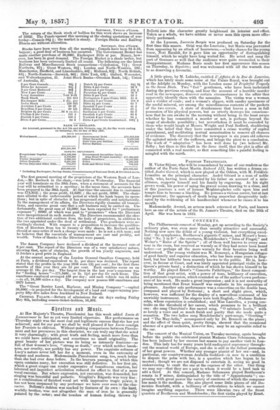fr Imitrts Het 311ttsir.
At Her Majesty's Theatre, Piccolomini has this week added Lucia di „Lammermoor to her as yet very limited repertoire. Her performance' on -Thursday night was the most real and legitimate success that she has yet achieved; and for our part we shall be well pleased if her Lucia consign her Traviata to oblivion. Without !Asking comparisons between Piccolomini and her precursors in this character, we can truly say that she acted it very charmingly ; with great truth and feeling, much more force than we could have anticipated, and sometimes no small originality. The great beauty of her picture was its being so intensely feminine—so fall of that woman's love "strong as death," over which neither harshness, nor cruelty, nor perfidy has any power. The exquisite softness of Lucy's nature never left her for a moment, even in the extremity of despair and madness. Mademoiselle Piccolomini sang, too, much better than she had ever done before. In the bravura passages, of which this opera contains many, her execution was still defective. In her first air, which a great singer can render expressive of tumultuous emotion, her laboured and imperfect articulation reduced its effect to that of a mere vocal exercise. But where expression, not execution, was demanded, her singing was beautiful and pathetic. Giuglini's Edgardo was very fine : as a combination of finished vocal art with impressive tragic power, it has not been surpassed by any performer we have ever seen in the character. Belletti's Aahton was marked by features of its own : the hard, worldly brother, was not altogether the man of iron he is generally painted by the actor; and the touches of human feeling thrown by Belletti into the character greatly heightened its interest and effect. Taken as a whole, we have seldom or never seen this opera more effectively performed.
At the Lyceum, Lucrezia Borgia was produced on Saturday for the first time this season. Grin was the Lucrezia ; but Mario was prevented from appearing by an attack of hoarseness,—a lucky chance for the young tenor, Neri Baraldi, for it gave hint an opportunity of distinguishing himself, which he might have long waited for. He acted and sang the part of Gennaro so well that the audience were quite reconciled to their disappointment. Madame Bosio made her first appearance this season on Thursday, in Bigoletto; and was welcomed with all the warmth duo to so deserving a favourite.
A little piece, by M. Labiehe, entitled L'Affaire de la Rue de Loureine,
which has lately made some noise at the Palais Royal, was brought out at the Adelphi on Monday, with the London name of Frightful Tragedy in the Seven Dials. Two fast" gentlemen, who have been inebriated during the previous evening, and hear the account of a horrible murder read in the newspaper, discover certain circumstances in the affair that apparently identify them with the assassins. The victim was a woman and a vender of coals ; and a woman's slipper, with sundry specimens of the useful mineral, are among the miscellaneous contents of the pockets of the two rovers. A state of drunkenness that leaves a man in full possession of his physical powers, but so utterly destroys his consciousness that he can awake in the morning without being in the least aware whether he has committed a murder or not, is perhaps beyond the range of alcoholic possibility ; but nevertheless it must be conceded by those who would laugh at Messrs. Wright and Paul Bedford, shuddering under the belief that they have committed a crime worthy of capitol punishment, and meditating mutual assassination to remove all chances of evidence. The discovery that the newspaper is six years old relieves the agitated minds of the sufferers, and brings the piece to a conclusion. The work of " adaptation" has been well done by (we believe) Mr. Selby ; but there is this fault in the farce itself, that the plot is after all connected with a real murder, so that something like a painful feeling is mingled with the mirth.


























 Previous page
Previous page